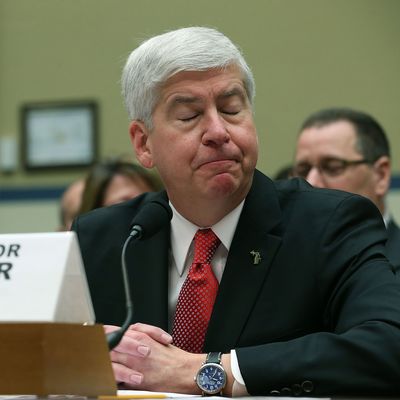
Former Michigan governor Rick Snyder is scheduled to begin a fellowship at Harvard’s Kennedy School on Monday. Snyder is infamous for presiding over the Flint water crisis and its mishandling, which was set in motion when the city switched water sources from Lake Huron and the Detroit River to the Flint River to cut costs. The Flint River was contaminated and officials failed to treat it properly to mitigate the effects. As a consequence, the water corroded many of the city’s pipes, releasing elevated lead levels into the taps of thousands of Flint residents and causing an outbreak of Legionnaires’ disease that infected 90 people and killed 12.
Snyder was responsible for appointing the head of Michigan’s Department of Environmental Quality, who ensures water safety statewide, and the emergency manager who oversaw the city when Flint’s water source was switched in 2014. The former governor also appears to have lied about when he first became aware that Flint’s water was unsafe. His administration did not implement emergency procedures until months after they knew about the crisis, while officials continued to insist that the water was safe despite its foul odor, rust color, and the fact that it was causing hair loss and rashes in people who bathed in it.
None of this was mentioned in Harvard’s announcement of Snyder’s fellowship on Sunday. Instead, Jeffrey Liebman, director of the Kennedy School’s Taubman Center for State and Local Government, cited the ex-governor’s commitment to “civility” as one of the key reasons why he will be granted a year to think, write, and lecture about governing on Harvard’s dime. “Governor Snyder brings his significant expertise in management, public policy, and promoting civility to Harvard Kennedy School,” Liebman said in a statement. “We are excited that he will be joining the Taubman Center and confident that he will bring tremendous value to us and our students.”
Civility has been a focal point of Snyder’s self-branding during his career. “Our country is in serious trouble because of the lack of civility at the national level,” he told the Detroit News in 2018 as he was leaving office. “That’s the greatest threat to our country.” He coined the mantra “relentless positive action” to describe his political ethos, and cited the pursuit of civility as a point of emphasis in his upcoming Harvard tenure. “I look forward to sharing my experiences in helping take Michigan to national leadership in job creation, improved government performance, and civility,” he said in a statement this weekend.
It would be notable if Harvard was merely overlooking Snyder’s fatal neglect in Flint, but to do so while touting what he can teach the Harvard community about civility seems especially perverse. Calls for “civility” have been invoked to shield or justify a laundry list of atrocities in the past year. Civility, according to its most vocal proponents, was why former Secretary of Homeland Security Kirstjen Nielsen should be allowed to dine publicly without interruption, despite separating immigrant children from their families and locking them in cages. Civility is why Representative Dan Crenshaw could initiate an Islamophobic smear campaign against his colleague Ilhan Omar, then get defended by his Republican compatriots when he faced criticism, because they felt he was the one being treated uncivilly. Civility is how Joe Biden rationalizes his past working partnerships with segregationists like James O. Eastland and Herman Talmadge, which he bragged about last week.
In these and related cases, the lack of tension that civility connotes has come to be viewed as its own desirable end. No matter who is damaged or to what extent, the responsible party resorts to demanding that everyone else remain civil in their response. This might be laudable were it aimed at just solutions, but more often than not, it is geared toward pacifying backlash and ensuring those who inflict the damage are let off the hook, while maintaining the pretense that their opponents are in the wrong. It smooths discourse while failing to solve conflict, in part because that conflict has been successfully reframed as a matter of the victims’ civility.
In this light, Snyder’s Harvard fellowship may have already taught its most valuable lesson about civility — as it is commonly deployed — without Snyder delivering a single lecture. It suggests that poisoned people in Flint are not worth disrupting the outward normalcy of government figures transitioning from lives of administrative neglect and violence to ones of cushy fellowships and platforms at elite institutions. Snyder is not alone in benefiting from this forced lack of tension. But the fact that he is named in a class-action lawsuit filed by Flint residents accusing him of “callous disregard” for their well-being, and is currently having his phone searched by federal investigators for evidence of criminal conduct, makes his elevation especially notable. That Harvard has embraced him anyway is indeed instructive. It just isn’t a lesson that anyone should be comfortable absorbing.






























